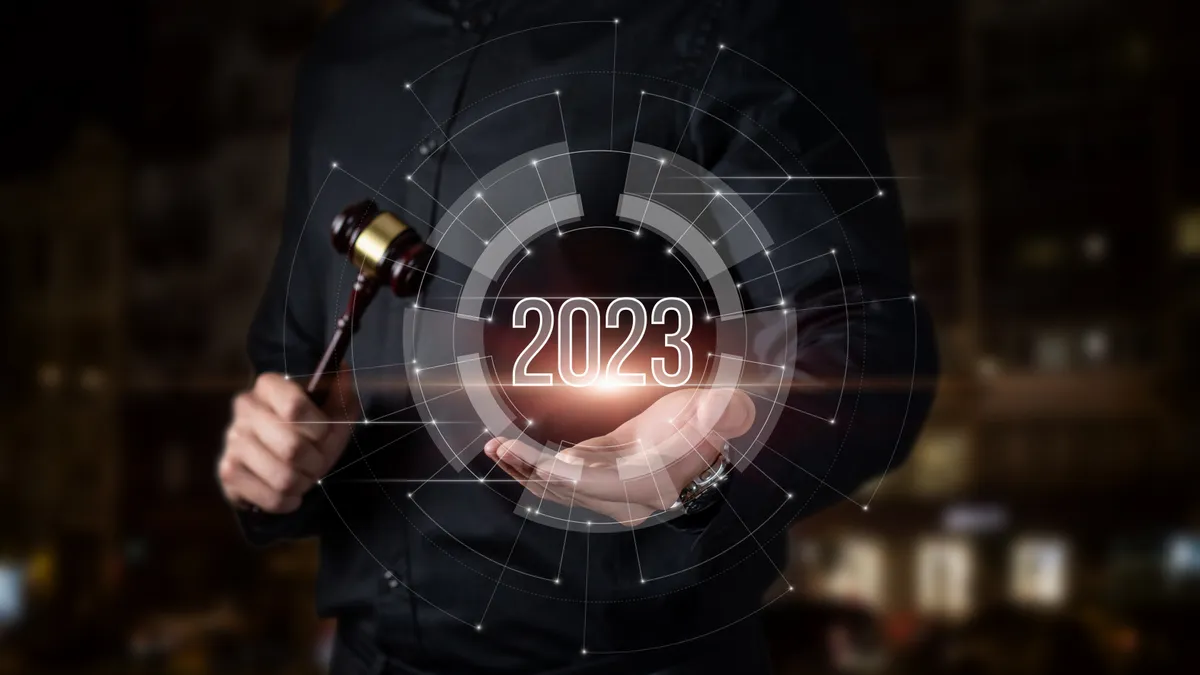Faced with pressure to do more with less as economic uncertainty continues, in-house legal department leaders will likely find themselves under the gun this year.
“Many legal chiefs are experiencing the most turbulent period of their entire careers,” Sophie Ross, the global CEO of FTI Technology, has said.
The turbulence is driving what are likely to be the biggest in-house legal trends this year: More reliance on legal operations staff and on the use of technology, particularly technology powered by artificial intelligence, and a redoubled effort to seek accommodation from law firms on fees.
“Corporate law departments continue to face the brunt of pressure points involving cost control and increasing workloads,” say analysts at the Thomson Reuters Institute and the Legal Value Network.
Against this backdrop is a stepped-up compliance picture, particularly in data privacy. Following California with its landmark consumer privacy law, which takes full effect this year, states across the country are enacting their own laws to regulate how companies operate online. And this could also be the year the federal government gets involved: last year Congress came close to enacting the American Data and Privacy Protection Act.
Another compliance area that is expected to command a lot of in-house attention are wage transparency and other employment-related laws. Several states, including New York, have enacted laws requiring employers to give a pay range when soliciting applications for jobs. Cities are doing it, too. Expect more to follow suit.
Meanwhile, the economic uncertainty is changing the mergers and acquisitions calculus, heightening the legal department’s role as more deals end in fights.
To help you get a picture of what the year holds, here’s Legal Dive’s take on some of the top in-house legal trends of 2023 that could shape your department’s operations.
Legal fees
Law firms have said they want to raise fees 7% to 8% this year, a Wells Fargo report says, but that goal flies in the face of pressure in-house law departments are under to cut costs.
Outside legal work is the highest cost faced by law departments by far, and it’s also the most unpredictable. Almost every legal chief in a Coleman Parkes survey said their legal bills are regularly higher than they expect, and 40% said they’re higher every single time they come in.
To bring those costs down, more departments are seeking alternative fee arrangements, but finding mixed success.
About 60% of law departments in big companies have been able to negotiate some kind of arrangement other than hourly billing, but only about 30% of smaller departments have been able to do that, according to a survey by the Association of Corporate Counsel and Major, Lindsey & Africa. Retainers and the use of blended rates are the arrangements getting the highest increase in use.
To help move the needle on these efforts and to more generally increase their department’s operational efficiency, legal leaders are expected to turn more to legal operations specialists. About 60% of legal departments have at least one legal ops specialist today, up from something closer to 45% a few years earlier, an ACC survey finds.
One way the legal ops function helps lower outside counsel costs is by enforcing billing discipline. That means rejecting fees that don’t follow the department’s billing guidelines, pushing for voluntary invoice reductions and turning to a competitive bidding process to light a fire under outside firms’ feet.
Legal operations
Most legal operations teams have between one and four individuals, but many have been growing in size and influence in recent years.
Given the current economic environment, legal ops teams in 2023 are likely to be even more closely consulted by legal department leaders seeking to achieve greater efficiency.
“The logical evolution of the legal ops function is that it becomes the general counsel’s right hand,” said Kevin Cohn, chief customer officer at Brightflag.
Mike Haven, president of the Corporate Legal Operations Consortium, recently told Legal Dive that one way legal operators can support law department leadership in tight economic times is by helping to implement process automation.
In a similar vein, experts predict legal operators will be increasingly called upon to lead legal departments technology adoption initiatives.
“The legal ops team needs to empower the staff with the best tools to make the right decisions and to streamline communication with the rest of the business,” said Terry Dohrmann, co-founder & chief revenue officer at Litify.
These efforts will help legal departments shift from being “a cost center to a revenue/business initiative driver,” he said.
The legal ops function has grown in tandem with specialized legal technology, and that is likely to continue. Almost 80% of legal teams said their use of technology accelerated over the last few years, mainly for contract management, matter management and e-signatures, a ContractsWorks survey found.
“The solutions that were quickly adopted by so many organizations during the pandemic seem to be just the start for the in-house legal community,” the ContractWorks report said.
AI-powered technology
Meanwhile, the release of OpenAI’s ChatGPT tool late last year quickly demonstrated the power of generative artificial intelligence to millions of people across the globe, including lawyers.
Not long after, the contract management provider Lexion announced the launch of its AI Contract Assist that utilizes GPT-3 technology to help attorneys complete contracting work in a more efficient manner.
AI in general, and generative AI in particular, is expected to produce further innovations that will aid the in-house legal industry in 2023.
“Generative AI has changed the paradigm of creativity by turning deep learning AI models into collaborators working with humans to generate new content and ideas,” said Omar Haroun, Relativity’s head of AI strategy.
Haroun also said he expects “the looming recession will be a catalyst for AI adoption as general counsels look to contain costs and require in-house and outside counsel to maximize efficiency.”
Beyond contracts, e-discovery is another area where the use of AI-powered tools is likely to grow.
“AI has the cycles to mine insights from vast quantities of data and uncover patterns in the haystack,” the e-discovery provider Everlaw has predicted.
Data privacy
The California Privacy Rights Act, known as CPRA, became effective on January 1.
It is one of a growing number of data privacy laws that corporations, particularly those doing business in multiple jurisdictions, must work to comply with this year.
“We predict data privacy compliance will consume significant resources and a greater share of mind than ever before within the legal department,” said Ray Pathak, Exterro’s VP of data privacy.
As a result, ActiveNav CEO Peter Baumann said he expects corporate legal teams “will finally embrace the tools and processes necessary to understand what type of risky customer data they are holding on to and where that risky data is stored.”
Meanwhile, there is a possibility corporations will eventually have to contend as well with a federal data privacy law.
In July, a U.S. House committee overwhelmingly approved the American Data Privacy and Protection Act with bipartisan support, though it hasn’t progressed further since then. The bill could preempt some of the efforts by states to regulate in the privacy domain.
“While the timing is still up in the air, I predict we will finally make progress on federal privacy legislation in the new year,” said Danielle Sheer, chief legal and compliance officer at Commvault.
Pay transparency
Several states and a number of cities have laws requiring employers to disclose pay when advertising to fill a position. New York City requires employers to advertise a pay range if they meet a size threshold and the job would be done at least in part in the city, for example.
Letting job applicants know the pay upfront is simple on its face, but employers have pushed back because it can expose disparities in their pay practices, opening them up to liability risk. They also say it limits their flexibility to tailor pay to the candidate.
In response, companies have been advertising broad ranges, but this approach could be challenged this year. Lawmakers in New York City have said they might modify their law to limit how wide these ranges can be because companies have been advertising ranges that are so wide that it calls into question whether they’re making a good-faith effort to comply.
If it passes as contemplated, the law change would limit ranges to double the lower amount – $60,000 on the low end to $120,000 on the high end, for example.
Employers shouldn’t have to worry about pay disparity complaints if they base differences on objective criteria, like years of experience and skill type, and write those criteria down in a formal policy.
“At the end of the day, it is permissible to pay people differently as long as there are legitimate reasons,” said Liz Washko of Ogletree Deakins.
Look for more state and local jurisdictions to pass laws. By one estimate, 20% of workers in the United States will soon be affected.
”This change is happening at lightning speed in the U.S. and could have a broad effect nationally,” a TechTarget report says.
M&A
Acquisitions reached a record setting $5 trillion in 2021 and although deals slowed last year, to roughly two-thirds that, the volume has been high enough that law firms that have specialists in the area have been charging a premium to work on the deals.
M&A work generated law firms’ highest billing rates of all activity types, a median $878 an hour, according to a LexisNexis CounselLink report.
Given the uncertain economy this year, deals will likely slow but demand for expert legal work should stay high as valuation and other conflicts increase.
“Performance of recent acquisitions may fall short of expectations, [producing] an upswing in M&A disputes over the coming year,” Kevin Hagon, a Berkeley Research Group (BRG) director, said in a company report last year.
“Prices are more volatile,” Matthew Weiniger, a Linklaters partner in London, said in the BRG report. “So when you sign the deal today to close in three months’ time, there’s a greater chance that your economic assumptions will be completely wrong at closing.”
Companies are willing to pay top dollar for M&A work because the activity is often central to their growth plans
“M&A matters are typically highly strategic, mission-critical transactions,” Kris Satkunas, CounselLink’s director of strategic consulting, told Legal Dive last year.
Compliance risk is rising too. In the last two years, the federal government’s antitrust regulators have started looking beyond deals’ potential consumer impact and scrutinizing them for their impact on data concentration, corporate board conflicts and employee pay.
That makes due diligence more complex separate from the economics of the deal.
What’s more, the Federal Trade Commission last year passed a resolution subjecting mergers that fall below the $101 million Hart-Scott-Rodino (HSR) threshold to automatic antitrust review.
The FTC already had the authority to look at smaller deals, but now they’ll automatically be subject to review in the same way as larger deals.
In short, economic uncertainty and stepped-up regulatory scrutiny means the cost of M&A legal work will likely stay high in 2023.


















